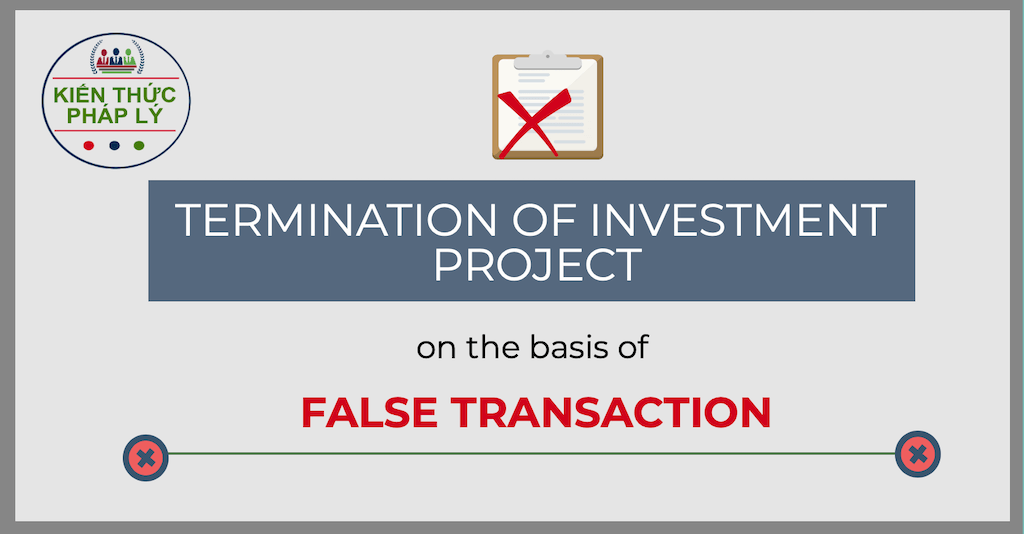Article 48.2(e) of the amended Law on Investment 2020 (the “2020 Investment Law”) reads:
“The investment licensing authority shall terminate the entire or a part of the investment project under the following circumstances:
[…]
e) The operation of investment conducted by the Investor based on the false civil transaction in accordance with the civil laws.
[…]”
This is a fresh legal basis for the termination of investment project incorporated by the 2020 Investment Law.
See the Vietnamese version of this article HERE.
How to determine false civil transactions?
In order to identify the so-called “false civil transaction”, the 2020 Investment Law provides no definition itself but refers to the prevailing Civil code (the 2015 Civil Code). Accordingly, Article 124 of the 2015 Civil Code provides that:
“1. Where parties enter into a transaction falsely for the purpose of concealing another civil transaction, such false transaction shall be invalid; notwithstanding the foregoing, the transaction which is concealed shall be valid, unless it is also invalid pursuant to the provisions of this Code or other relevant laws.
2. Where a civil transaction is falsely entered into for the purpose of evading responsibilities to a third person, such civil transaction shall be invalid.”
On the face of it, the above provision does not attempt to define the “false civil transaction” in a direct manner. According to Dr. Dang Thi Thom, in consideration of Article 124 of the 2015 Civil Code, false transaction may be defined as “transactions in which the intention of the parties exposed to the public is different from its true (original) intention and there occurs a difference between the actual outcome of the transaction and the its true purpose”.[1]
In the investment realm, there is a wide range of transactions which may be deemed “false transaction” as those transactions have reflected the key features provided under the above definition. For instance, the nominee agreement[2], in which the foreign investor enters into an agreement with the Vietnamese individuals to “use” them as the signatory of the investment. By doing so, the foreign investor purports to (i) evade the licensing requirements and procedures applicable to them or (ii) invest in the business sectors restricted to foreign investors. Accordingly, the Vietnamese individuals, as the nominees, shall be recorded as the owner(s) of the company to be established in all legal paperwork. However, the rights conferred by laws upon the owner shall actually be executed by the foreign investor instead of the Vietnamese nominees pursuant to the nominee agreement. Concurrently, the parties shall enter into a loan agreement under which the foreign investor provides the nominees with a loan (equal to the charter capital of the company to be established) in order to legalize the fund allocated by the foreign investor to the nominees under the nominee agreement.
Termination of the investment project – What are the exact legal consequences?
The nominee transaction as illustrated above are surprisingly vivid and varies differently from one jurisdiction to another but it generally serves for the purpose of obviating the needs for conducting required investment procedures applicable to the foreign investor. In practice, such transactions occur very often, especially when Vietnam did not open its market to foreign investor and thereafter, upon the free market access, for the business sectors which remain restricted to the foreign investors or their market entry viability is unclear in the absence of commitments under the WTO Commitment or any other treaties to which Vietnam is a signatory party.
In the past, despite the fact that the 2014 Investment Law is silent on such regards, the legal counsels in the course of rendering legal advice for transactions involving nominee arrangements have already referred to the risk of project termination. To clarify, if a nominee agreement is exposed to the Court as the result of a dispute arising from the concerned parties, the Court may likely declare the nominee agreement to be invalid and the investment project may be terminated. While the former is advised based on the Civil code, the latter is solely made on the basis of “logical prediction” without any explicit legal basis. With the adoption of the 2020 Investment Law, this will no longer be the case.
In consideration of the 2020 Investment Law, the author opines that there are two groups of legal consequences, particularly (i) the concerned parties to a nominee agreement may be required to conduct the liquidation of the investment project[3] and (ii) the Investment Registration Certificate (IRC) issued for the investment project shall be withdrawn by the investment licensing authority[4].
For the second group of legal consequence regarding the withdrawal of the IRC and taking the nominee agreement as mentioned above into account, as the company established under the nominee agreement is not subject to the requirement of IRC (since it is established by the Vietnamese individuals / local investors[5]), the withdrawal of the IRC shall not be applicable upon the exposal of this false transaction.
For the first group of legal consequences regarding the liquidation of investment project, as the investment project is also the company, therefore, the liquidation of investment project means the liquidation of the company, or put it differently, the dissolution of the company. At this stage, the amended law on enterprise 2020 (the “2020 Enterprise Law”) must be taken into account. Article 207 of the 2020 Enterprise Law reads:
“The dissolution of a company occurs under the following circumstances:
a) Upon the expiry of the operational term as specified in the Charter without any extensions thereof;
b) Upon the resolution, decision of the owner of the enterprise applicable to private enterprise, [resolution] of the Members’ council applicable to partnerships, [resolution] of the Members’ council, [decisions] of the owner of the enterprise applicable to limited liability company, [resolution] of the General Meeting of shareholders applicable to joint-stock company;
c) Upon the failure of the company to maintain the minimum members prescribed by this Law within 06 consecutive months without conducting the enterprise conversion procedures;
d) Upon the withdrawal of the Enterprise Registration Certificate, unless otherwise provided by the Law on Tax Management.”
Of all circumstances as provided above, it can be inferred that the most appropriate legal basis for the dissolution of the company as the result of false transaction under Article 48.2(e) of the 2020 Investment Law may only be (d) upon the withdrawal of the Enterprise Registration Certificate (ERC). To further clarify, the licensing authority may withdraw the ERC of the company established under the nominee agreement in light of Article 212 of the 2020 Enterprise Law following either sub-section as indicated below:
- Firstly, pursuant to Article 212(a) as the contents of the enterprise registration dossiers are falsified. The falsification in the enterprise registration dossiers is determined by the fact that the actual owner of the company is the foreign investor while the registered owner of the company is the Vietnamese nominees; or
- Secondly, according to Article 212(dd) upon the request of the competent authority. In this case, the investment licensing authority, upon its discovery of the falsified transaction and termination of the investment project, may serve a request to the enterprise licensing authority regarding the withdrawal of the ERC as the project at hand is also the company.
For the foreign investors, when the nominee agreements are exposed, their investment can still be refunded and they may even be entitled to a part of its profit pursuant to the 2020 Investment Law and the 2015 Civil Code on invalid transactions. Henceforth, if the purpose of such provision in the 2020 Investment Law is to prevent the nominee agreement, its effectiveness remains doubtful since the risks, in the worst case, are not so substantial and may be accepted[6] to a certain extent in consideration of the benefits that such a transaction could bring to the foreign investor.
[1] Dr. Dang Thi Thom, “Asset sale and purchase transaction to conceal the loan transaction” (Journal of People’s Supreme Court) <https://tapchitoaan.vn/bai-viet/phap-luat/giao-dich-mua-ban-tai-san-nham-che-giau-giao-dich-vay-tai-san>
[2] Indochine Counsel, <https://www.indochinecounsel.com/ic-5-30-1361-Special_Alert_%7C_Key_Changes_under_the_Vietnam’s_New_Investment_Law_and_Enterprise_Law.html>, Special Alert
[3] The 2020 Investment Law, Article 48.4.
[4] The 2020 Investment Law, Article 48.6.
[5] The 2020 Investment Law, Article 37.2(a)
[6] Truong Huu Ngu, “It is not easy to handle investment activites made based on false transactions” (Thoi Bao Kinh Te Sai Gon) <https://www.thesaigontimes.vn/306500/khong-de-xu-ly-hoat-dong-dau-tu-dua-tren-giao-dich-gia-tao-.html?fbclid=IwAR3PptSRNuGTEFobbpGLlWXYvJpzV9WPRhXrf1GTBRLLrclXDEUg-GER6YE>
Xem thêm thông tin tác giả tại ĐÂY.
- HẠN CHẾ RỦI RO TỪ ĐIỀU KHOẢN CAM ĐOAN, BẢO ĐẢM VÀ BỒI HOÀN TRONG GIAO DỊCH M&A – GÓC NHÌN TỪ BÊN BÁN - Tháng Bảy 21, 2024
- BỒI THƯỜNG THIỆT HẠI ẤN ĐỊNH THEO QUY ĐỊNH CỦA PHÁP LUẬT VIỆT NAM (Phần 3) - Tháng Năm 25, 2024
- BỒI THƯỜNG THIỆT HẠI ẤN ĐỊNH THEO QUY ĐỊNH CỦA PHÁP LUẬT VIỆT NAM (tiếp theo) - Tháng Mười Một 11, 2023








One Comment